新视野大学英语读写教程第二版第二册课后练习答案
- 格式:docx
- 大小:23.18 KB
- 文档页数:16
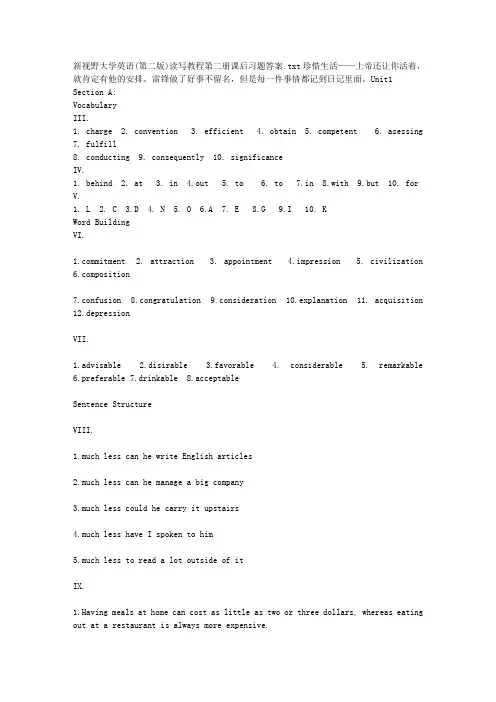
新视野大学英语(第二版)读写教程第二册课后习题答案.txt珍惜生活——上帝还让你活着,
就肯定有他的安排。雷锋做了好事不留名,但是每一件事情都记到日记里面。Unit1
Section A:
Vocabulary
III.
1. charge 2. convention 3. efficient 4. obtain 5. competent 6. asessing
7. fulfill
8. conducting 9. consequently 10. significance
IV.
1. behind 2. at 3. in 4.out 5. to 6. to 7.in 8.with 9.but 10. for
V.
1. L 2. C 3.D 4. N 5. O 6.A 7. E 8.G 9.I 10. K
Word Building
VI.
mitment 2. attraction 3. appointment 4.impression 5. civilization
position
7.confusion 8.congratulation 9.consideration 10.explanation 11. acquisition
12.depression
VII.
1.advisable 2.disirable 3.favorable 4. considerable 5. remarkable
6.preferable 7.drinkable 8.acceptable
Sentence Structure
VIII.
1.much less can he write English articles
2.much less can he manage a big company
3.much less could he carry it upstairs
4.much less have I spoken to him
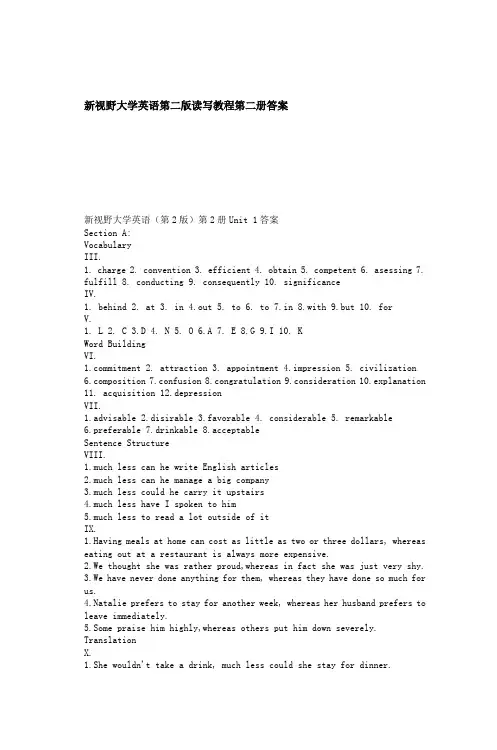
新视野大学英语第二版读写教程第二册答案
新视野大学英语(第2版)第2册Unit 1答案
Section A:
Vocabulary
III.
1. charge 2. convention 3. efficient 4. obtain 5. competent 6. asessing 7.
fulfill 8. conducting 9. consequently 10. significance
IV.
1. behind 2. at 3. in 4.out 5. to 6. to 7.in 8.with 9.but 10. for
V.
1. L 2. C 3.D 4. N 5. O 6.A 7. E 8.G 9.I 10. K
Word Building
VI.
mitment 2. attraction 3. appointment 4.impression 5. civilization
position 7.confusion 8.congratulation 9.consideration 10.explanation
11. acquisition 12.depression
VII.
1.advisable 2.disirable 3.favorable 4. considerable 5. remarkable
6.preferable 7.drinkable 8.acceptable
Sentence Structure
VIII.
1.much less can he write English articles
2.much less can he manage a big company
3.much less could he carry it upstairs
4.much less have I spoken to him
5.much less to read a lot outside of it
![新视野大学英语读写教程(第二版)第二册课后练习答案[1]](https://uimg.taocdn.com/6da91aa00029bd64783e2c78.webp)
1 新视野大学英语(第二版)第二册Unit 1答案
Unit 1
Section A
I Comprehension of The Text
1. The attitude is that if one is not moving ahead he is falling behind.
2. Time is treated as if it were something almost real. (People budget it, waste it, steal it, kill it, cut
it, account for it; they also charge for it.) They do this because time is a precious resource.
3. Everyone is in a rush — often under pressure. City people always appear to be hurrying to get
where they are going, restlessly seeking attention in a store or elbowing others as they try to
complete their shopping.
4. Don’t take it personally. This is because people value time highly and they resent someone else
―wasting‖ it beyond a certain appropriate point.
5. New arrivals in America will miss opening exchanges, the ritual interaction that goes with a cup
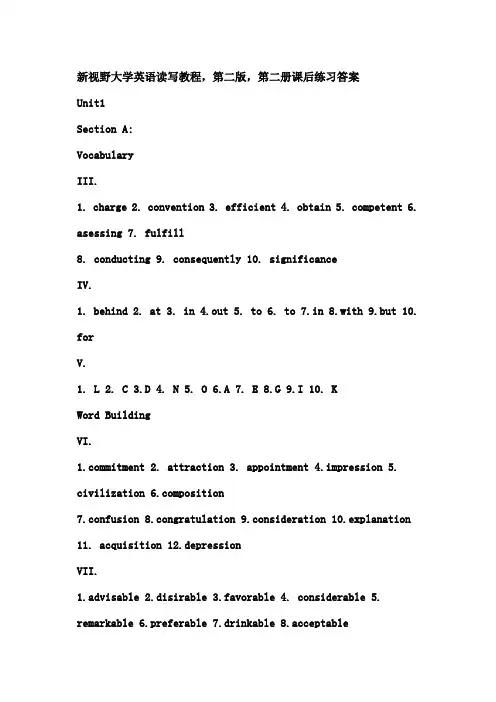
新视野大学英语读写教程,第二版,第二册课后练习答案
Unit1
Section A:
Vocabulary
III.
1. charge 2. convention 3. efficient 4. obtain 5. competent 6.
asessing 7. fulfill
8. conducting 9. consequently 10. significance
IV.
1. behind 2. at 3. in 4.out 5. to 6. to 7.in 8.with 9.but 10.
for
V.
1. L 2. C 3.D 4. N 5. O 6.A 7. E 8.G 9.I 10. K
Word Building
VI.
mitment 2. attraction 3. appointment 4.impression 5.
civilization position
7.confusion 8.congratulation 9.consideration 10.explanation
11. acquisition 12.depression
VII.
1.advisable 2.disirable 3.favorable 4. considerable 5.
remarkable 6.preferable 7.drinkable 8.acceptable
Sentence Structure
VIII 1.much less can he write English articles
2.much less can he manage a big company
3.much less could he carry it upstairs
4.much less have I spoken to him
5.much less to read a lot outside of it
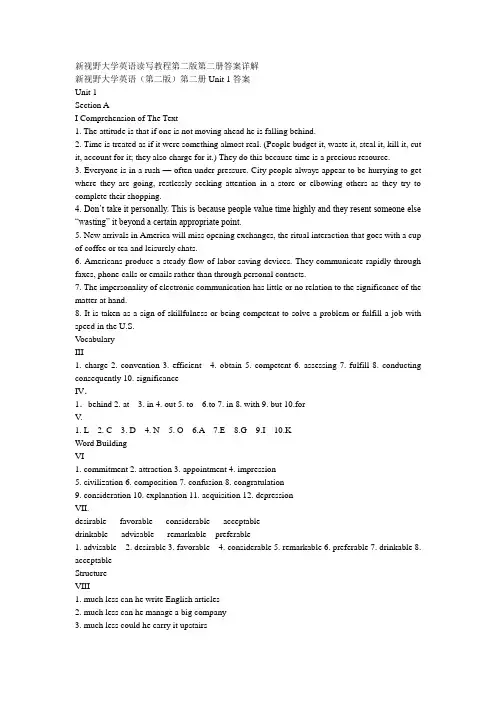
新视野大学英语读写教程第二版第二册答案详解
新视野大学英语(第二版)第二册Unit 1答案
Unit 1
Section A
I Comprehension of The Text
1. The attitude is that if one is not moving ahead he is falling behind.
2. Time is treated as if it were something almost real. (People budget it, waste it, steal it, kill it, cut
it, account for it; they also charge for it.) They do this because time is a precious resource.
3. Everyone is in a rush — often under pressure. City people always appear to be hurrying to get
where they are going, restlessly seeking attention in a store or elbowing others as they try to
complete their shopping.
4. Don’t take it personally. This is because people value time highly and they resent someone else
―wasting‖ it beyond a certain appropriate point.
5. New arrivals in America will miss opening exchanges, the ritual interaction that goes with a cup

新视野大学英语第二册课后翻译答案(U1-U7)汉译英2008-05-29 18:29Unit 1
1. 在有些人眼里,毕加索(Picasso)的绘画会显得十分荒谬。
In the eyes of some people, Picasso’s paintings would seem rather foolish.
2. 他们利润增长部分的原因是由于采用了新的市场策略。
The increase in their profits is due partly to their new market strategy.
3. 那个男人告诉妻子把药放在最上面的搁架上,这样孩子们就够不着了。
The man told his wife to keep the medicine on the top shelf so that it would be beyond the
children’s reach.
4. 有钱不一定幸福。
Happiness doesn’t always go with money.
5. 那辆小汽车从我买来以后尽给我添麻烦。
That car has given me nothing but trouble ever since I bought it.
Unit 2
1.自今年夏初起, 海尔公司 (Haier) 展开了空调促销的广告大战。
Since the beginning of this summer, Haier has waged a massive ad campaign to promote its
air-conditioner sales.
2.玛丽的父母不同意她去美国,因此她最终能否实现自己的愿望尚不可知。
Mary’s parents frown on the idea of her going to America, so it remains to be seen whether she
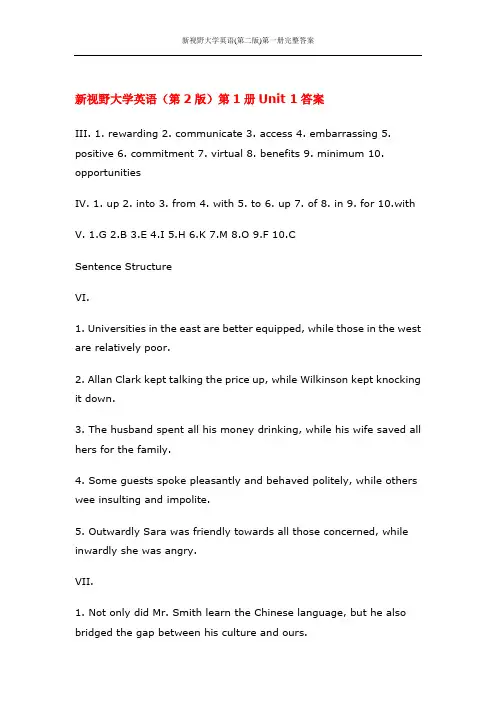
新视野大学英语(第二版)第一册完整答案
新视野大学英语(第2版)第1册Unit 1答案
III. 1. rewarding 2. communicate 3. access 4. embarrassing 5.
positive 6. commitment 7. virtual 8. benefits 9. minimum 10.
opportunities
IV. 1. up 2. into 3. from 4. with 5. to 6. up 7. of 8. in 9. for 10.with
V. 1.G 2.B 3.E 4.I 5.H 6.K 7.M 8.O 9.F 10.C
Sentence Structure
VI.
1. Universities in the east are better equipped, while those in the west
are relatively poor.
2. Allan Clark kept talking the price up, while Wilkinson kept knocking
it down.
3. The husband spent all his money drinking, while his wife saved all
hers for the family.
4. Some guests spoke pleasantly and behaved politely, while others
wee insulting and impolite.
5. Outwardly Sara was friendly towards all those concerned, while
inwardly she was angry.
VII.
1. Not only did Mr. Smith learn the Chinese language, but he also

秋风清,秋月明,落叶聚还散,寒鸦栖复惊。
新视野大学英语读写教程,第二版,第二册课后练习答案
unit 1
Section A:
Vocabulary
III.
1. charge 2. convention 3. efficient 4. obtain 5. competent 6.
asessing 7. fulfill
8. conducting 9. consequently 10. significance
IV.
1. behind 2. at 3. in 4.out 5. to 6. to 7.in 8.with 9.but 10.
for
V.
1. L 2. C 3.D 4. N 5. O 6.A 7. E 8.G 9.I 10. K
Word Building
VI.
mitment 2. attraction 3. appointment 4.impression 5.
civilization position
7.confusion 8.congratulation 9.consideration 10.explanation
11. acquisition 12.depression
VII.
1.advisable 2.disirable 3.favorable 4. considerable 5.
remarkable 6.preferable 7.drinkable 8.acceptable
Sentence Structure
VIII.
1.much less can he write English articles
2.much less can he manage a big company
3.much less could he carry it upstairs
4.much less have I spoken to him
5.much less to read a lot outside of it
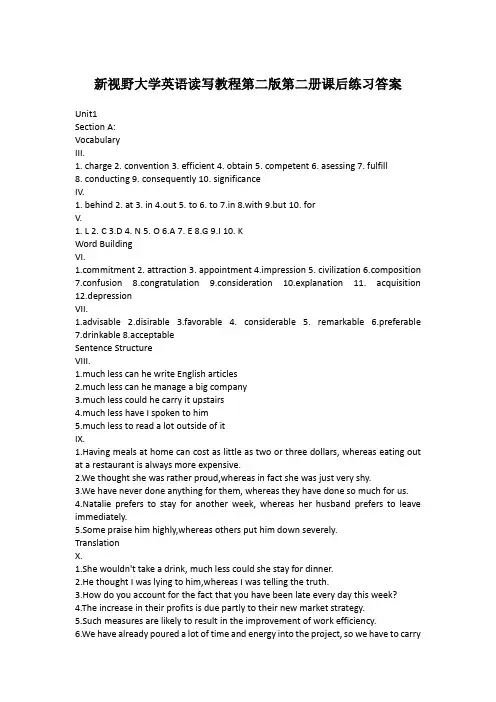
新视野大学英语读写教程第二版第二册课后练习答案
Unit1
Section A:
Vocabulary
III.
1. charge 2. convention 3. efficient 4. obtain 5. competent 6. asessing 7. fulfill
8. conducting 9. consequently 10. significance
IV.
1. behind 2. at 3. in 4.out 5. to 6. to 7.in 8.with 9.but 10. for
V.
1. L 2. C 3.D 4. N 5. O 6.A 7. E 8.G 9.I 10. K
Word Building
VI.
mitment 2. attraction 3. appointment 4.impression 5. civilization
position
7.confusion 8.congratulation 9.consideration 10.explanation 11. acquisition
12.depression
VII.
1.advisable 2.disirable 3.favorable 4. considerable 5. remarkable 6.preferable
7.drinkable 8.acceptable
Sentence Structure
VIII.
1.much less can he write English articles
2.much less can he manage a big company
3.much less could he carry it upstairs
4.much less have I spoken to him
5.much less to read a lot outside of it
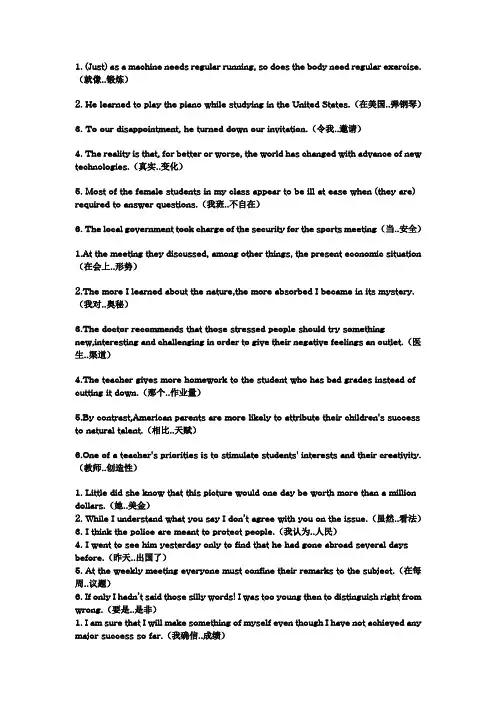
1. (Just) as a machine needs regular running, so does the body need regular exercise.(就像..锻炼)
2. He learned to play the piano while studying in the United States.(在美国..弹钢琴)
3. To our disappointment, he turned down our invitation.(令我..邀请)
4. The reality is that, for better or worse, the world has changed with advance of new
technologies.(真实..变化)
5. Most of the female students in my class appear to be ill at ease when (they are)
required to answer questions.(我班..不自在)
6. The local government took charge of the security for the sports meeting(当..安全)
1.At the meeting they discussed, among other things, the present economic situation(在会上..形势)
2.The more I learned about the nature,the more absorbed I became in its mystery.(我对..奥秘)
3.The doctor recommends that those stressed people should try something
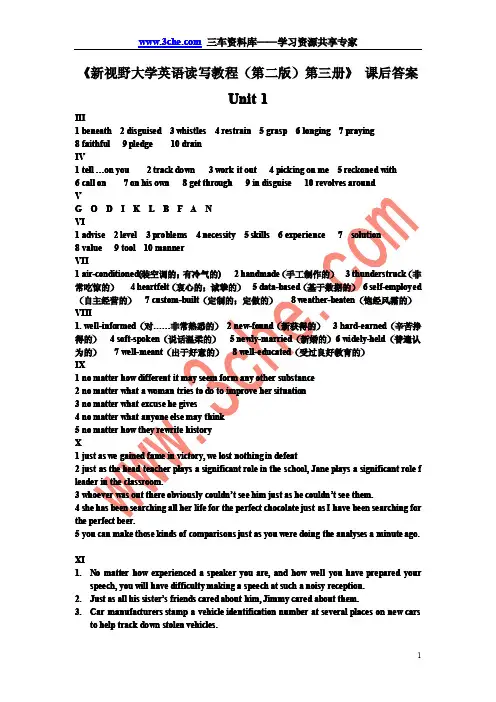
三车资料库——学习资源共享专家
1《新视野大学英语读写教程(第二版)第三册》课后答案
Unit1
III
1beneath2disguised3whistles4restrain5grasp6longing7praying
8faithful9pledge10drain
IV
1tell…onyou2trackdown3workitout4pickingonme5reckonedwith
6callon7onhisown8getthrough9indisguise10revolvesaround
V
GODIKLBFAN
VI
1advise2level3problems4necessity5skills6experience7solution
8value9tool10manner
VII
1air-conditioned(装空调的;有冷气的)2handmade(手工制作的)3thunderstruck(非
常吃惊的)4heartfelt(衷心的;诚挚的)5data-based(基于数据的)6self-employself-employeded
(自主经营的)7custom-built(定制的;定做的)8weather-beaten(饱经风霜的)
VIII
1.well-informed(对……非常熟悉的)2new-found(新获得的)3hard-earned(辛苦挣
得的)4soft-spoken(说话温柔的)5newly-married(新婚的)6widely-held(普遍认
为的)7well-meant(出于好意的)8well-educated(受过良好教育的)
IX
1nomatterhowdifferentitmayseemformanyothersubstance
2nomatterwhatawomantriestodotoimprovehersituation
3nomatterwhatexcusehegives
新视野大学英语读写教程,第二版,第二册课后练习答案 unit 1
Section A:
Vocabulary
III.
1. charge 2. convention 3. efficient 4. obtain 5. competent 6. asessing 7. fulfill
8. conducting 9. consequently 10. significance
IV.
1. behind 2. at 3. in 4.out 5. to 6. to 7.in 8.with 9.but 10. for
V.
1. L 2. C 3.D 4. N 5. O 6.A 7. E 8.G 9.I 10. K
Word Building
VI.
mitment 2. attraction 3. appointment 4.impression 5. civilization position
7.confusion 8.congratulation 9.consideration 10.explanation 11. acquisition 12.depression
VII.
1.advisable 2.disirable 3.favorable 4. considerable 5. remarkable 6.preferable 7.drinkable
8.acceptable
Sentence Structure
VIII.
1.much less can he write English articles
2.much less can he manage a big company
3.much less could he carry it upstairs
4.much less have I spoken to him
5.much less to read a lot outside of it
新视野大学英语读写教程第二版第二册课后练习答案
Unit 6
Vocabulary
III.
1.confessed 2. reserve 3. professional 4.
impressive 5. latter
6. convey 7. qualify 8. refined 9. substitute 10.
approval
IV.
1. Correct from: fill out; synonym: fill in
2. Correct from: feel comfortable with; synonym: feel
comfortable about
3. Correct from: attach first importance to; translation: 非常重视;把……放在第一位
4. Correct from: turned down; synonym: rejected; refused
5. Correct from: came (up) to; definition: moved toward
6. Correct from: pressing me for; definition: try in a
determined way to get something.
7. Correct from: free from/of; definition: not influenced by
8. Correct from: stuck with; translation: 不得不接待;被迫接待
9. Correct from: for better or worse; definition: whether the
result is good or bad
新视野大学英语第二版读写教程第四册课后练习答案
Unit One
III.
1. idle 2. justify 3. discount 4. distinct 5. minute
6.accused 7. object 8. contaminate 9. sustain 10. worship
IV.
1. accusing... of 2. end up 3. came upon 4. at her worst 5. pay for
6. run a risk of 7. participate in 8. other than 9. object to/objected
10. at best
V
1. K 2. G 3. C 4. E 5. N 6.O 7.I 8. L 9. A 10. D
Collocation
VI.
1. delay 2. pain 3. hardship 4. suffering 5. fever
6. defeat 7. poverty 8. treatment 9. noise 10. agony
Word building
VII.
1. justify 2. glorify 3. exemplifies 4. classified
5. purified 6. intensify 7. identify 8. terrified
VIII.
1. bravery 2. jewelry 3. delivery 4. machinery
5. robbery 6. nursery 7. scenery 8. discovery
Sentence Structure
IX.
1. other than for funerals and weddings
2. other than to live an independent life
Mikerean 你的私人答案整理顾问
1 新视野大学英语(第二册) 答案
Unit One
Section A
II Comprehension of The Text
1.The attitude is that if one is not moving ahead, he is falling behind.
2.Time is treated as if it were something almost real. People budget it, waste it, steal it, kill it, cut it,
account for it; they also charge for it. They do this because time is a precious resource.
3.Everyone is in a rush—often under pressure. In the writer‟s eyes, city people always appear to be
hurrying to get where they are going, restlessly seeking attention in a store, or elbowing others as they
try to complete their shopping.
4.
Don‟t take it personally. This is because people value time highly, and they resent someone else
“wasting” it beyond a certain appropriate point.
5.This is because Americans generally assess and enquire about their visitors professionally rather than
新视野大学英语读写教程2
参考答案
1 新视野大学英语(第二版)第二册Unit 1答案
Unit 1
Section A
I Comprehension of The Text
1. The attitude is that if one is not moving ahead he is
falling behind.
2. Time is treated as if it were something almost real.
(People budget it, waste it, steal it, kill it, cut it,
account for it; they also charge for it.) They do this
because time is a precious resource.
3. Everyone is in a rush — often under pressure. City
people always appear to be hurrying to get where they
are going, restlessly seeking attention in a store or
elbowing others as they try to complete their
shopping.
4. Don’t take it personally. This is because people
value time highly and they resent someone else
―wasting‖ it beyond a certain appropriate point.
5. New arrivals in America will miss opening
exchanges, the ritual interaction that goes with a cup
新视野大学英语读写教程第二版第二册课后练习答案
新视野大学英语读写教程第二版第二册课后练习答案
Unit 1
Section A
III
1. charge
2. convention
3. efficient
4. obtain
5. competent
6. assessing
7.fulfill
8. conducting consequently 10. significance
IV.
1.behind 2. at 3. in 4. out 5. to 6.to 7. in 8. with 9. but 10.for
V.
1. L
2. C
3. D
4. N
5. O
6.A
7.E
8.G
9.I 10.K
Word Building
VI
1. commitment
2. attraction 3. appointment
4.impression
5. civilization
6. composition
7. confusion
8.congratulation
9. consideration 10. explanation 11. acquisition
12.depression
VII.
desirable favorable considerable acceptable
drinkable advisable remarkable preferable
1. advisable
2.desirable
3. favorable
4. considerable
5. remarkable
6. preferable
7. drinkable
8. acceptable
Structure
VIII
1. much less can he write English articles
2. much less can he manage a big company
3. much less could he carry it upstairs
4. much less have I spoken to him
5. much less to read a lot outside of it
IX
1. Having meals at home can cost as little as two orthree
dollars, whereas eating out at a restaurant is always more
expensive. 2. We thought she was rather proud, whereas in factshe was
just very shy.
3. We have never done anything for them, whereas theyhave
done so much for us.
4. Natalie prefers to stay for another week, whereasher
husband prefers to leave immediately.
5. Some praise him highly, whereas others put him
downseverely
Translation
X.
1. She wouldn’t take a drink, much less wouldshe stay for
dinner.
2. He thought I was lying to him, whereas I wastelling the
truth.
3. How do you account for the fact that you have beenlate
every day this week?
4. The increase in their profits is due partly totheir new
market strategy.
5. Such measures are likely to result in theimprovement of
work efficiency.
6. We have already poured a lot of time and energyinto the
project, so we have to carry on.
XI
1. 我认为他不会抢劫,更不用说暴力抢劫了。
2. 男工平均工资每小时10美元,而女工才每小时7美元。
3. 自然界的平衡一旦遭到破坏,就会带来很多不可预知的影响。
4. 期终考试迫在眉睫,你最好多花点时间看书。
5. 有趣的是,消费者发现越来越难以辨别某些品牌的原产国。其部分原因来自于全球化带来的影响,部分原因是由于产地的变化。
6. 最近一次调查表明,妇女占总劳动力的40%。 Cloze
1. C
2.B
3.B
4.A
5.D
6.B
7.C
8.D
9.A 10.C
11.D 12.C 13.C 14.B 15.A
Structured Writing
XIV.
A larger and larger part of society is expressing itsconcern
about environmental protection. Active in their concern, teachers
andstudents hold specific meetings to discuss environmental
protection. Also, cityplanners take environmental problems into
serious consideration. And, thoughreducing pollution can be
expensive, factories often take every possiblemeasure to do their
part. Many people are concerned and active because air
andwater pollution affects everyone and makes it difficult for
cities to surviveand businesses to make a profit.
Section B.
Comprehension of the Text
II.
1. D
2.A
3.C
4.D
5.A 6.C
7.B
8.B
Vocabulary
III.
1. utilize
2.reject
3. considerable
4. temporary
5. acceptable
6. recognition
7. alleviate
8. appreciate
9.furthermore 10. interact
IV.
1. interact with
2. gone through
3. deal with
4.recovered from
5. adjusting to
6. familiar to
7. In spiteof
8. were tired of
9. prevented from 10. came to
Unit 2
III.
1. promising
2.amusing
3. lowered
4. persisted 5. rank
6. swear
7.unfair
8. presence
9. frowning 10. approximately
IV.
1. on
2.upon
3. on
4. in
5. by
6. to
7. in
8. of
9. on 10. out
V. 1.O 2.K 3.D 4.H 5.J 6.E 7.M 8.G 9.B 10.A
Word Building
VI.
1. observe—observer: one who observes aperson or an
event
2. ski—skier: one who skis
3. visit—visitor: one who visits somebodyor some place
4. learn—learner: one who learns something
5. report—reporter: one who reports onpersons or events for
a newspaper
6. drink—drinker: one who often drinksalcohol, esp, too
much
VII.
Tropical global dangerous central environmental occasional
musical natural